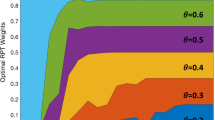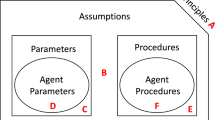Abstract
We investigate the problem of reallocation with priorities where one has to assign objects or positions to individuals. Agents can have an initial ownership over an object. Each object has a priority ordering over the agents. In this framework, there is no mechanism that is both individually rational (IR) and stable, i.e. has no blocking pairs. Given this impossibility, an alternative approach is to compare mechanisms based on the blocking pairs they generate. A mechanism has minimal envy within a set of mechanisms if there is no other mechanism in the set that always leads to a set of blocking pairs included in the one of the former mechanism. Our main result shows that the modified Deferred Acceptance mechanism (Guillen and Kesten in Int Econ Rev 53(3):1027–1046, 2012), is a minimal envy mechanism in the set of IR and strategy-proof mechanisms. We also show that an extension of the Top Trading Cycle (Karakaya et al. in J Econ Theory 184:104948, 2019) mechanism is a minimal envy mechanism in the set of IR, strategy-proof and Pareto-efficient mechanisms. These two results extend the existing ones in school choice.
Similar content being viewed by others
References
Abdulkadiroğlu, A., Che, Y.-K., Pathak, P.A., Roth, A.E., Tercieux, O.: Efficiency, justified envy, and incentives in priority-based matching. Am. Econ. Rev. Insights 2(4), 425–42 (2020)
Abdulkadiroglu, A., Pathak, P.A., Roth, A.E.: Strategy-proofness versus efficiency in matching with indifferences: redesigning the New York City High School Match. Am. Econ. Rev. 99(5), 1954–1978 (2009)
Abdulkadiroglu, A., Sonmez, T.: House allocation with existing tenants. J. Econ. Theory 88, 233–260 (1999)
Abdulkadiroglu, A., Sonmez, T.: School choice: a mechanism design approach. Am. Econ. Rev. 93, 729–747 (2003)
Alva, S., Manjunath, V.: Strategy-proof Pareto-improvement. J. Econ. Theory 181, 121–142 (2019)
Biró, P., McDermid, E.: Matching with sizes (or scheduling with processing set restrictions). Discrete Appl. Math. 164, 61–67 (2014)
Chen, Y., Kesten, O.: Chinese college admissions and school choice reforms: a theoretical analysis. J. Polit. Econ. 125(1), 99–139 (2017)
Combe, J., Tercieux, O., Terrier, C.: The design of teacher assignment: theory and evidence. Rev. Econ. Stud. rdac002 (2022). https://doi.org/10.1093/restud/rdac002
Compte, O., Jehiel, P.: Voluntary Participation and Re-assignment in Two-sided Matching. Unpublished mimeo, Paris School of Economics (2008)
Dur, U., Kesten, O.: Sequential versus simultaneous assignment systems and two applications. Econ. Theory 68(2), 251–283 (2019)
Dur, U.M., Ünver, M.U.: Two-sided matching via balanced exchange. J. Polit. Econ. 127(3), 1156–1177 (2019)
Ehlers, L., et al.: Robust minimal instability of the top trading cycles mechanism. Microecon. Am. Econ. J. (2021)
Gale, D., Shapley, L.S.: College admissions and the stability of marriage. Am. Math. Mon. 69, 9–15 (1962)
Guillen, P., Kesten, O.: Matching markets with mixed ownership: the case for a real-life assignment mechanism. Int. Econ. Rev. 53(3), 1027–1046 (2012)
Hafalir, I.E., Kojima, F., Yenmez, M.B.: Interdistrict school choice: a theory of student assignment. Working Paper (2019)
Hafalir, I.E., Yenmez, M.B., Yildirim, M.A.: Effective affirmative action in school choice. Theor. Econ. 8(2), 325–363 (2013)
Inspection générale de l’administration de l’Education nationale et de la recherche: Les mouvements académiques et départementaux comme outils de gestion des ressources humaines. 67 (2015)
Kamada, Y., Kojima, F.: Recent developments in matching with constraints. Am. Econ. Rev. 107(5), 200–204 (2017)
Kamada, Y., Kojima, F.: Stability concepts in matching under distributional constraints. J. Econ. Theory 168, 107–142 (2017)
Karakaya, M., Klaus, B., Schlegel, J.C.: Top trading cycles, consistency, and acyclic priorities for house allocation with existing tenants. J. Econ. Theory 184, 104948 (2019)
Kesten, O., Kurino, M.: Strategy-proof improvements upon deferred acceptance: A maximal domain for possibility. Games Econ. Behav. 117, 120–143 (2019)
Kojima, F.: School choice: Impossibilities for affirmative action. Games Econ. Behav. 75(2), 685–693 (2012)
Kojima, F., Tamura, A., Yokoo, M.: Designing matching mechanisms under constraints: an approach from discrete convex analysis. J. Econ. Theory 176, 803–833 (2018)
Kwon, H., Shorrer, R.I.: Justified-envy-minimal efficient mechanisms for priority-based matching. Available at SSRN 3495266 (2020)
Ma, J.: Strategy-proofness and the strict core in a market with indivisibilities. Int. J. Game Theory 23, 75–83 (1994)
Pereyra, J.S.: A dynamic school choice model. Games Econ. Behav. 80, 100–114 (2013)
Roth, A.E.: The evolution of the labor market for medical interns and residents: a case study in game theory. J. Polit. Econ. 92, 991–1016 (1984)
Roth, A.E.: A natural experiment in the organization of entry-level labor markets: regional markets for new physicians and surgeons in the United Kingdom. Am. Econ. Rev. 81, 415–440 (1991)
Roth, A.E., Sonmez, T., Unver, U.: Kidney exchange. Q. J. Econ. 119, 457–488 (2004)
Shapley, L., Scarf, H.: On cores and indivisibility. J. Math. Econ. 1, 22–37 (1974)
Sidibe, M., Ba, B., Bayer, P., Rim, N., Rivera, R.: Police officer assignment and neighborhood crime. Working Paper (2021)
Sonmez, T., Unver, M.U.: House allocation with existing tenants: a characterization. Games Econ. Behav. 69(2), 425–445 (2010)
Author information
Authors and Affiliations
Corresponding author
Additional information
Publisher's Note
Springer Nature remains neutral with regard to jurisdictional claims in published maps and institutional affiliations.
I am grateful to Elias Bouacida, Yeon-Koo Che, Simon Gleyze, Philippe Jehiel, Josuè Ortega, Vasiliki Skreta, Olivier Tercieux and seminar participants at UCL. I am also grateful for the support from Vasiliki Skreta’s ERC Grant No. 682417, Frontiers in Design—Frontiers in Mechanism Design: Methodology and Applications. All potential mistakes are mine.
Rights and permissions
Springer Nature or its licensor (e.g. a society or other partner) holds exclusive rights to this article under a publishing agreement with the author(s) or other rightsholder(s); author self-archiving of the accepted manuscript version of this article is solely governed by the terms of such publishing agreement and applicable law.
About this article
Cite this article
Combe, J. Reallocation with priorities and minimal envy mechanisms. Econ Theory 76, 551–584 (2023). https://doi.org/10.1007/s00199-022-01465-x
Received:
Accepted:
Published:
Issue Date:
DOI: https://doi.org/10.1007/s00199-022-01465-x




